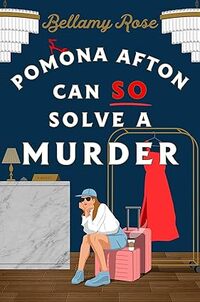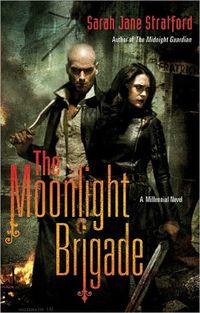 POMONA AFTON CAN SO SOLVE A MURDER |
 March Into Romance: New Releases to Fall in Love With! |

Purchase
Macmillan Thriller Military, Thriller Paranormal - Supernatural Excerpt of The Moonlight Brigade by Sarah Jane StratfordChapter One Berlin. April 20, 1941.
The Nazis prided themselves on being boisterous singers, and the show they made of gathering around tables set with the bounty of a Christmas feast, all to sing songs praising their Führer on his birthday, was laughable to anyone who dared to laugh. The figure of a man lounging outside the house, just out of range of the candlelight, did not laugh, but rather yawned. Every well-appointed house in Berlin was hosting an eerily similar party. The candles in a wooden ring, as if they were at a child’s party, the table as heavily laden as rationing would permit, with rabbit, bratwurst, rice porridge, and a plum cake that must have used up a month’s sugar ration—it all transcended ridiculous and was instead boring. The toasts, the songs, even the jokes were the same, as though everyone were acting in the same play. "One that could not be more dull if it were called Puritans on Parade," the figure muttered, nudging his brushed wool fedora farther up his forehead to study the faces inside. To a casual passerby, it might be assumed he was a vagrant—until one noticed that his fine tweed overcoat was of a quality rarely seen, even in peacetime. Under the coat, he exuded a strength and swagger that most found intimidating, and others, intriguing. Of the latter, these often ended up finding out more than they wanted to know—and always too late. Another song honoring Hitler commenced. The unseen watcher rolled his eyes and turned from the window, focusing on his hand. He curled and uncurled his fingers several times, then held them straight and outspread, popping out long, sharp talons from under the nails. They snapped back in place, then shot out again. Several more times they sang out and back, lethal cuckoos in a clock, and their owner smiled down at them with fondness. He might have been a young boy playing with a switchblade, but of course, Mors was no boy. Nor was he young, except at heart. Rather, he was older than anything in Berlin except the dirt. And what he could do with these talons was something few wanted to see. The song finished, and Mors yawned again, the unnecessary action one of his few sources of amusement. If anything, Germany under the Nazis was even more egotistical and vicious than he had found it when he first arrived in 1938. He and four other British millennial vampires had hoped to bring down the Nazis and thus prevent the war that was now devastating so much of Europe. Berlin, a chilly place in 1938, was now downright icy, even in spring. The Nazis confounded him, which was a rare feat. He had thought he had seen the basest of humanity before. He’d romped happily through the reigns of Caligula and Nero, after all, and had seized the opportunity to have a drink with Attila the Hun. Brutal warrior. Wonderful drinking songs, though. Very clever rhymes. The British vampires had seen ghastly things all throughout their own land, and in their travels had seen even more. Chaos fed the demon inside, but most vampires—especially as they grew older—preferred humans when they were at peace and harmony, pursuing art and invention. Such things fed the human soul and thus sweetened the blood of even the lowest criminal. So it was a blow, after such a lively interval as the 1920s and much of the 1930s, to see the world descend into hell again. And what a hell! The Jews had known plenty of grief, but having survived in Europe through the Middle Ages and to be so seemingly integrated now, well, it was no wonder they little expected such disaster in the age of radio, telephone, film, and short skirts. "And it’s only getting worse. For all except those who deserve it," Mors grumbled, his eyes tinged with red as he glared at the celebrants. He knew it only too well. He had spent several months scouring Europe, searching for his missing friend Cleland and engaging in any military conflict he could in the hopes of turning the tide. His own successes had been disturbingly few, thanks to the persistence of battles being waged mostly during the day. The Allies’ low success rate upset him far more. Convinced at least that Cleland had not gone back to England or anywhere else on the Continent, Mors had returned to Berlin, full of horrible certainty. He would prefer the novelty of uncertainty. Since he could not allow himself even to contemplate the idea that Cleland was dead, Mors was now almost sure that his friend had been captured and was still being held. He would have to be found. Soon. Certainty. They had been so full of certainty. When the British vampires arrived soon after Kristallnacht, they were sure they’d be home in a few months at most. After all, they were millennials, more than one thousand years old and thus possessed of immense power. It took special skill and weaponry to kill a millennial. The five of them—Brigit, Cleland, Swefred, Meaghan, and Mors—had the strongest confidence in their intelligence and abilities. Which hadn’t been enough against the strength of human will. But time quickly became a gushing wound, spilling out and out and out, and their accomplishments were absorbed in the pool and as good as unnoticed, undone. Until the end. They had disabled a hangar of planes and destroyed a bomb-making factory, along with, it was hoped, most of the Nachtspeere, Hitler’s special team of vampire hunters. But it did not go as planned. Swefred and Meaghan had sacrificed themselves in an explosion that decimated the Nachtspeere. But that explosion had also separated Cleland from the others. Mors had assured Brigit that Cleland was not dead. Brigit. He had held her, stroked her hair, wiped her eyes. And knew she needed to leave him. Or rather, he needed her to leave him. They were best friends, as close as brother and sister, but his real love for her had burned inside him for centuries. If they were alone together, really alone, it would be too unbearable. Something would break. She needed to go back to England to her partner, Eamon, and Mors needed to search for Cleland alone. He had spent plenty of time alone and had no fear of it. He feared for Brigit, though, however irrational that was. He was a double millennial, far more powerful even than she. Otonia, older yet and the leader of the British vampire tribunal, had once told him she thought vampires could gift each other some strength under extraordinary circumstances. With nothing else to give Brigit, Mors had kissed her and felt a measure of himself slip out of his body and into hers. It was a little thing, he assured her, and he as good as ordered her to go home, where she would be safe while he carried on the war effort in his own way, heading to Russia. He wondered if she’d believed him, any of it. She knew he was a storyteller, after all. It had taken more than he could have imagined to leave her sobbing behind him in that dark tunnel while he walked off whistling. Whistling! He wondered if she hated him in that moment. She might have forgiven him if she’d known the pain he was in, far beyond the love he’d finally confessed. That gift was more costly than anything in Harrods. He’d struggled his way to neutral Sweden to recover himself, which took much, much too long by his standards. Since he was already bathing in the novelty of guilt, he decided to compound it by confirming her safety, as well as asking if Cleland had come home. He had sent a telegram to Eamon, feeling sure of the moment when Eamon was near the machine Otonia had stolen. He had not been surprised to feel that certainty. Brigit had a powerful connection to Eamon that extended over the waters. Mors had given her something of himself. It was only right that there be some small part of her inside him. Eamon, he knew, valued his honor. If Mors swore him to secrecy about his true business, he would keep that secret, even if it troubled him. The telegram Mors soon received was terse indeed, the younger vampire’s rage showing through the purple lettering. But it told Mors what he needed to know: Brigit was safe, there was no word of Cleland, and Eamon would say nothing to anyone, not even Cleland’s beloved partner, Padraic. So there it was. And here he was, back in the palm of the iron fist that was strangling so much of Europe. The war was going well for Germany, despite not having subdued Britain. The few snatches of Goebbels’s birthday speech Mors had managed to hear the night before only confirmed the worst. A revolting speech, adulating Hitler as though he were a god. Mors had seen many Roman emperors proclaimed gods in their day. It rarely went well. The one piece of grim luck Mors had been allotted since returning to comb Berlin for Cleland was the sight of Nachtspeere. Despite the millennials having incinerated so many of their numbers that August dawn, they were gradually being replenished. Which meant someone, somewhere, thought that vampire hunters were still needed. That was all to the good, even as the thought made his eyes glow that much more red. Evening parties were still a place where guard was let down, faculties distorted by drink, and hearts swollen with warmth and good feeling. The opportunity was offered to interrogate someone on their way home. So Mors waited, and watched. And at this, the seventh party spied upon this evening, there was a member of the Nachtspeere present. The Nachtspeere had white-blond hair and the sort of square chin that would shoo him straight into matinee-idol status were his nose not so small. That didn’t dissuade one of the young girls from showering him with familiar smiles and overly tinkling laughs and all manner of flirtations so as to make herself look foolish. At last, the hosts, weary of the diversion, suggested to the Nachtspeere that he ought to see the girl home, as she was looking peaked. "And we’re open for business." Mors gloated, cracking his knuckles. The hosts found the Nachtspeere and girl’s coats and hats and wrapped the pair up with a studied efficiency. Mors shook his head. One would have thought every man and woman in Germany had endured efficiency training. The average wheel cog is not so well oiled. The tipsy Nachtspeere didn’t seem sorry to be leaving and tossed an arm over his sudden companion’s shoulder, allowing his hand to brush her breast. The girl giggled nervously. "Dieter, you embarrass me." "Shame on you, Dieter, stop embarrassing the young lady," Mors scolded, dropping heavy arms around the couple, who jumped and shrieked. Mors laughed his booming, singsong laugh that kept them from realizing they were being propelled into shadows. "Were … were you at the party?" the girl ventured timorously, although of course she would have noticed him. Although he appeared to be in his early forties, his effortless magnetism—to say nothing of his obvious wealth—would have rendered him the object of all that glad-eyeing, not Dieter. "Oh, my dear, I have been to all the parties," Mors informed her. "But here’s the bastard of the matter. There’s one particular guest I’m always trying to find, and he always eludes me, slippery little devil. Then I saw you, Dieter, and I knew you were a fellow who might be able to help. You seem the sort who has access to classified information, if you get me." A wave of gratification washed over Dieter. The man’s voice was so warm, melodious, his accent so educated. It, more than his elegant clothes, bespoke him as the very finest in German society, perhaps the descendant of a titled family. Dieter would be more than happy to tell this man anything, and he desperately hoped he had some useful information. The parade of rewards he would receive in return goose-stepped across his mind. "I believe you are in the truly secret police, am I right? The branch so special one dares not speak its name?" Mors asked, eyebrow raised. "Gestapo?" the girl piped up, not wholly willing to be ignored. "That’s rather exciting! Have you arrested any Jew dogs?" Dieter didn’t hear a word of her prattle, he was staring at Mors. "How … how did you know?" Mors raised an eyebrow, then darted his eyes to the all- but-invisible insignia on Dieter’s shoulder, nearly buried in the seam. The sign of a fang, with a red slash run through. "What do you know of him, Dieter? I promise there is much reward for information." "Which ‘him,’ sir? There is more than one animal we seek." The delighted astonishment that rushed through Mors stayed well under the surface of his skin. "Seek!" Then Cleland was indeed at liberty, and he and Mors must have gone in circles searching for each other. The other "animal" could only be Mors himself. He pressed his advantage. The silly lad obviously thought he was a rich man on a private enterprise—the sort who pays bounties for vampires and displays relics of them like bearskins. Mors played it up. "I am interested in all animals; you must see that." Dieter grinned and leaned in confidentially. "There is a Dutch rat, hoarding more rats, attempting to shuffle them out." Mors kept his eyebrows firmly in place. "Dutch? You’re quite certain?" "Oh, yes," Dieter gloated. "Thanks to our good work, he’s heard of the August Incident—" Oh, now, really—"the August Incident"? Must they be so prosaic? "—and we think he’s coming to Berlin. If more rats follow, then straight into the cage they go." Mors was bewildered. A Dutch vampire? Could that perhaps be Cleland in disguise? It was a touch bizarre, but delectable. Cleland must have some plan. The girl giggled, intruding inappropriately on the important talk of men. "‘Cage’—you mean Dachau? Why don’t you just say so? Serves the stupid Jews right, if they think they can come back in here." Dieter glared at the girl. "I think it’s time you went home, Maria," he announced in glacial tones. Maria began to argue, and Mors, irritated, stepped in to silence them. But Maria, having drunk far too much, lashed out at Dieter and knocked Mors’s hat off, revealing the whole of his memorable face, including his famously bald head. Dieter exhaled long and low, and Mors could feel the man’s skin tingle with chilly anticipation. The new Nachtspeere were taught by the Irish hunters whose skill was renown through the vampire world, and had been made to study history. Few vampires were bigger history than Mors. Dieter’s thought process was far too slow. Mors took hold of the man’s right hand as it reached inside his jacket, and instead lifted the stake from its holder himself. "There is no need for such action, and besides, you must know this little stick is ineffective against the likes of me," Mors scolded, rubbing the stake to dust in his hand. His eyes still on Dieter, he stuck out a foot to trip Maria as she started to run away. She smacked the ground hard; even Dieter could hear her nose break as it hit the stone alley. "Stop your yowling, you horrid girl," Mors told her, pressing his foot into the back of her neck. She was promptly silent. "Women do tend to overreact, haven’t you noticed?" Mors inquired. "Help, Hegarty!" Dieter screamed. "Nachtspeere, someone, it’s—!" Mors clamped a hand over Dieter’s mouth and sat him down, nearly folding the man under him. "This doesn’t have to hurt. I might even let you go—I’m a sweetie like that. Just tell me what I want to know." Dieter tried to lunge at Mors, growling, "Blutsauger!" "Yes, technically, I am a bloodsucker," Mors agreed. "Although there’s rather more to it than that. Oh well, if you won’t help…" Dieter squealed and clutched at Mors. "Wait, wait, no! I can tell you he’s nearly here, the Dutch one. We think he’ll be searching the tunnels, perhaps near the Stammstrecke route of the U-Bahn. Hegarty and Malone are setting the trap even now. They’ll be expecting me!" That last was a lie, of course, but Mors thought the rest of it well worth investigating. He very much wanted to know who this "Dutch one" was. Mors patted Dieter on the shoulder and stood, knowing full well the Nachtspeere was going to lunge at his neck with a dagger. "Oh, Dieter, really!" Mors sighed. "Not the quickest study, are you?" He forced Dieter’s hand to drop the dagger and then reach for his pistol, putting a bullet into the prone Maria. "Very ungentlemanly of you," Mors said, turning the pistol back on Dieter’s own head and pulling the trigger. "Some men simply can’t take rejection." Wiping his hands on Dieter’s handkerchief, he cataloged the information, his mind already ticking toward the next port of call. A mysterious Dutch vampire, who he hoped was not in fact so mysterious, possibly walking into a trap tonight. A gift for the Führer, indeed. He had to hurry without appearing to hurry. If a hunter called Hegarty was nearby, caution must be used. Mors was exceedingly fond of the element of surprise. Mors tossed the handkerchief into a rubbish bin and made his way toward the Stammstrecke line. His fingers were tingling. The smell of impending death was already in the air. Excerpt from The Moonlight Brigade by Sarah Jane Stratford |
|
| |||
|
||||



 © 2003-2025
© 2003-2025